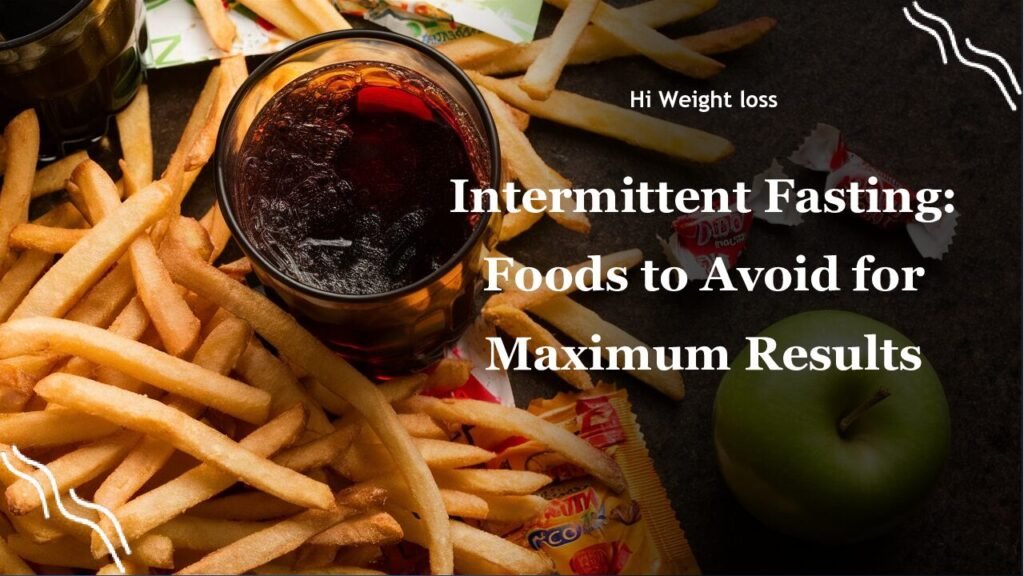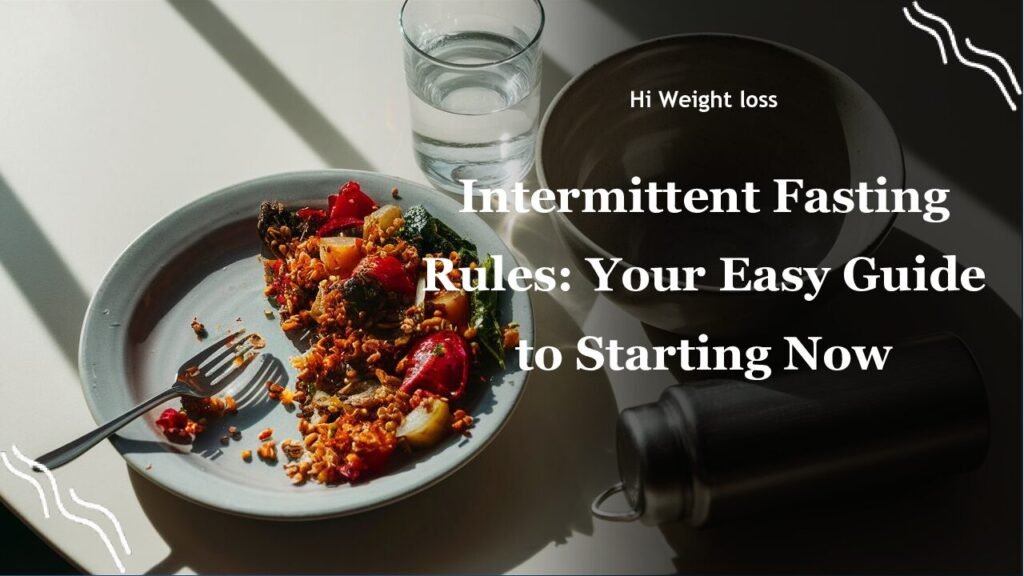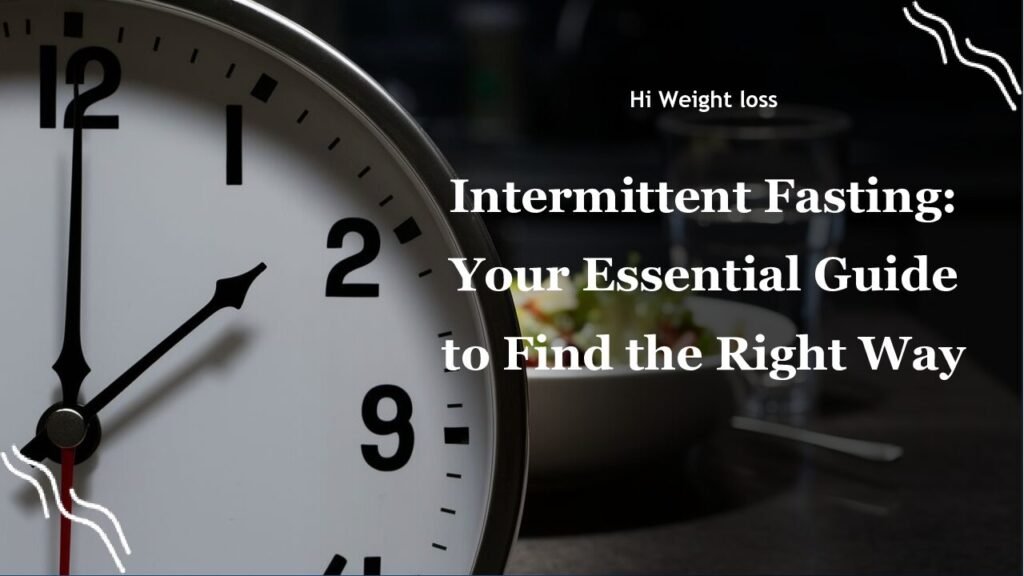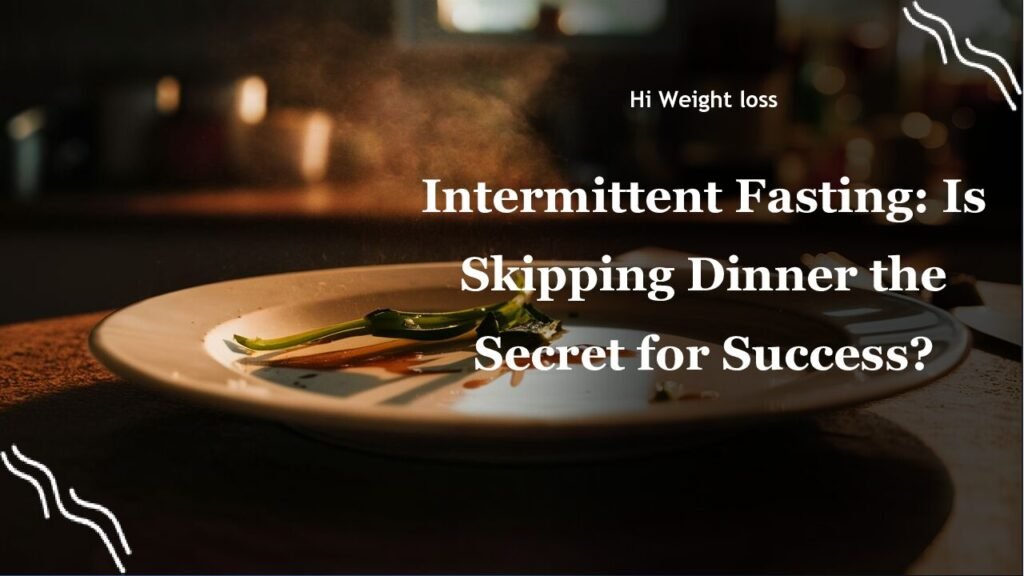“`
Trying intermittent fasting but feeling like you’re not seeing the results you expected? Maybe you’re accidentally sabotaging your efforts by consuming the wrong foods and drinks during your eating window. Many people struggle to make the most out of intermittent fasting due to not knowing what to avoid, but don’t worry, I’m here to help; this article will explore exactly which items should be off the menu when you are intermittent fasting so you can optimize your journey and help you achieve your goals.
What Not to Eat When Intermittent Fasting?
Intermittent fasting can be a powerful tool for weight management and overall health, but it’s crucial to understand that *what* you eat is just as important as *when* you eat. I remember when I first started, I thought that as long as I stuck to my fasting window, I could eat anything during my eating period. I quickly learned this was far from the truth, and I felt awful for it! Choosing the wrong foods can disrupt your fast, lead to cravings, and even hinder your health goals.
Sugary Beverages: The Fasting Saboteur
One of the biggest culprits when it comes to derailing your intermittent fasting efforts is sugary drinks. These beverages, such as sodas, sweetened juices, and even some flavored coffees, can cause rapid spikes in your blood sugar and insulin levels. Have you ever had that post-soda crash and felt a need to eat something immediately? This insulin spike kicks you out of the fasting state, making it harder to burn fat and also leading to increased cravings. According to NDTV Health, “sugar intake can cause poor blood sugar control.”
Instead of reaching for these sugary beverages, opt for alternatives such as water, herbal teas, or black coffee. These options can help keep you hydrated without interfering with the fasting process. A little tip: I love adding a slice of lemon or some mint to my water for a bit of extra flavor!
High-Calorie Drinks: Empty Calories You Can Skip
High-calorie drinks, while sometimes tasty, are often loaded with empty calories and minimal nutritional value. Think milkshakes, smoothies packed with added sugars, or even sweetened lemonade. These drinks can quickly rack up your calorie count without providing much in the way of vitamins or minerals, making it hard to lose weight or improve your health. Trifecta Nutrition warns against drinks “high in empty calories.”
If you choose to have caloric beverages, focus on healthier options such as 100% fruit juice, pressed vegetable juices, or low-fat milk in moderation. However, plain water is the best choice, especially during your fasting period. What’s the healthiest drink you usually have?
Processed Foods: The Enemy of Your Goals
Processed foods often contain refined carbohydrates and unhealthy fats, both of which can severely disrupt your intermittent fasting progress. These foods also tend to be highly addictive. I used to find myself reaching for a bag of chips out of habit, not because I was truly hungry, and this greatly affected my fasting goals. The body tends to crave the foods it’s used to having.
Instead, focus on eating whole, nutrient-dense foods like fruits, vegetables, lean proteins, and whole grains. These will provide your body with the necessary fuel, keep you feeling full, and help you achieve your fitness goals. According to ndtv.com , processed foods can “sabotage your fasting goals”.
Fried Foods: High Calories and Unhealthy Fats
Fried foods, such as french fries, fried meat, and seafood, can be incredibly tempting. However, these foods are not only high in calories but also often contain unhealthy trans fats that are harmful to your health. It can be very hard to stay away from them when you are hungry, they are not a healthy option for you when you are intermittent fasting. Trifecta Nutrition highlights how fried foods may contain “trans fats, which are detrimental to health.”
Try to avoid them as much as possible. A good rule of thumb is to choose baked, grilled, or steamed options instead. Your body will definitely thank you! Are you a fan of fried foods?
Foods High in Added Sugar: The Sweet Trap
Foods loaded with added sugar, like desserts, pastries, candy, and sugary cereals, can be another downfall to intermittent fasting. They provide little to no nutritional value and can quickly lead to intense sugar cravings, making it harder to maintain your fasting schedule and also affect your mood. If you consume a lot of sugar, you will find it much more difficult to deal with cravings when you are intermittent fasting.As noted by NDTV Health, these foods “can lead to sugar cravings and poor blood sugar control.”
It’s best to satisfy any sweet cravings with whole fruits or small amounts of natural sweeteners such as honey or stevia, if necessary. Have you noticed how hard it is to stay away from sugary foods?
High-Sodium Foods: A Pressure Issue
Foods high in sodium, like many processed snacks, fast foods, and canned goods, can negatively impact your blood pressure and overall health. These foods contribute to the body retaining water and can lead to the feeling of bloating, and are best avoided as much as possible when doing intermittent fasting. According to Trifecta Nutrition, high-sodium foods can “negatively impact blood pressure and overall health.”
Always look at the nutrition label of the food you are consuming, and if possible, cook at home using healthy ingredients. What’s your favorite healthy snack?
Alcoholic Drinks: The Fasting Interrupter
Alcoholic beverages can interfere with intermittent fasting by disrupting the fasting state and also reducing your awareness about food choices. A night out with a few drinks can easily undo all your hard work. It’s crucial to note that alcohol can dehydrate the body and also make you crave unhealthy food options. NDTV Health mentions, alcohol can “disrupt the fasting state”.
For the best results, avoid alcohol, particularly during your fasting period. Have you tried to practice intermittent fasting after a night out?
High-Fat Foods: Digesting Troubles
While some healthy fats are definitely essential for a balanced diet, consuming high amounts of fat, especially from unhealthy sources like milkshakes or greasy cheeseburgers, can be difficult for the body to digest after a fast, causing bloating and discomfort. I once made the mistake of eating a large, fatty meal after a 16-hour fast. The digestive discomfort was awful, and it totally ruined my day. According to trifectanutrition, consuming high-fat foods can lead to bloating and discomfort.
It’s best to incorporate fats from healthy sources like avocados, nuts, and olive oil in moderation. Listen to your body and pay attention to how certain foods make you feel.

Here is a helpful table summarizing foods to avoid during intermittent fasting and why:
| Food Category | Why Avoid |
|---|---|
| Sugary Beverages | Spike insulin, disrupt fasting, lead to cravings |
| High-Calorie Beverages | Empty calories, minimal nutritional value |
| Processed Foods | Refined carbs, unhealthy fats, sabotage fasting goals |
| Fried Foods | High in calories, unhealthy trans fats |
| Foods High in Added Sugar | Lead to sugar cravings, poor blood sugar control |
| High-Sodium Foods | Negatively impact blood pressure and overall health |
| Alcoholic Drinks | Disrupt the fasting state, lead to poor food choices |
| High-Fat Foods (unhealthy) | Difficult to digest after a fast, cause bloating and discomfort |
Conclusion
Intermittent fasting can be a very powerful way to improve your health, but it requires careful attention to what you eat, not just when you eat. By avoiding sugary beverages, high-calorie drinks, processed foods, fried foods, foods with added sugar, high-sodium items, alcohol, and excessive amounts of unhealthy fats, you’ll be much better equipped to reach your health goals. Remember my experience of sabotaging my own intermittent fasting attempts? By learning what not to eat, you avoid making the same mistakes. Prioritize whole, nutrient-dense foods, listen to your body, and make sustainable choices for a healthier and happier you. Small, consistent changes can make all the difference, and you will be able to achieve what you set out to do. Now, why not start taking steps today to transform your fasting journey?
FAQ
Can I have diet soda during intermittent fasting?
While diet sodas are calorie-free, their artificial sweeteners may still trigger insulin responses in some people, which can disrupt the fasting state. It’s best to stick to water, herbal teas, or black coffee.
What are some healthy snack alternatives?
Good snack options include a handful of nuts, a piece of fruit, or a few slices of avocado. These provide healthy fats and fiber, keeping you satiated until your next meal.
How long should I wait before eating after a fast?
The waiting time varies. Start with a manageable fast period (12-16 hours) and gradually adjust it as your body adapts. Listen to your body’s hunger cues and don’t force yourself.
Is it okay to cheat occasionally during intermittent fasting?
Occasional “cheats” are okay, but consistency is key. Try to avoid frequent indulgences in unhealthy foods, which can hinder progress and set you back.
How much water should I drink during intermittent fasting?
It is important to stay well-hydrated, so aim for at least 8 glasses of water a day, and more if you are very active. Water will keep you feeling fuller and also help in burning fat.
“`



